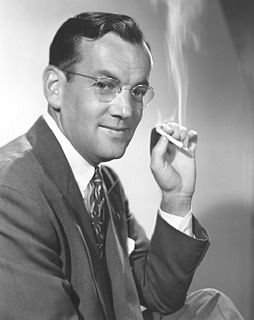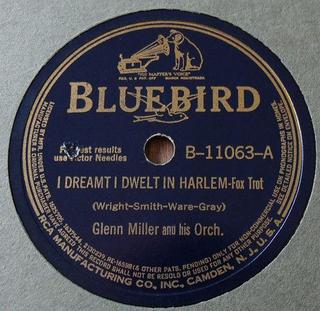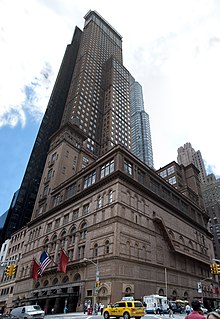
Glenn Miller and His Orchestra was an American swing dance band formed by Glenn Miller in 1938. Arranged around a clarinet and tenor saxophone playing melody, and three other saxophones playing harmony, the band became the most popular and commercially successful dance orchestra of the Swing era and one of the greatest singles charting acts of the 20th century.

Gordon Lee "Tex" Beneke was an American saxophonist, singer, and bandleader. His career is a history of associations with bandleader Glenn Miller and former musicians and singers who worked with Miller. His band is also associated with the careers of Eydie Gormé, Henry Mancini and Ronnie Deauville. Beneke also solos on the recording the Glenn Miller Orchestra made of their popular song "In The Mood" and sings on another popular Glenn Miller recording, "Chattanooga Choo Choo". Jazz critic Will Friedwald considers Beneke to be one of the major blues singers who sang with the big bands of the early 1940s.

"It Happened in Sun Valley" is a 1941 song composed by Harry Warren and with lyrics by Mack Gordon. It was recorded and featured by Glenn Miller and his Orchestra in the movie Sun Valley Serenade.
Irving "Babe" Russin was a tenor saxophone player.

"Moonlight Serenade" is an American swing ballad composed by Glenn Miller with subsequent lyrics by Mitchell Parish. It was an immediate phenomenon when released in May 1939 as an instrumental arrangement, though it had been adopted and performed as Miller's signature tune as early as 1938, even before it had been given the name "Moonlight Serenade." In 1991, Miller's recording of "Moonlight Serenade" was inducted into the Grammy Hall of Fame.

Ernesto Caceres was an American jazz saxophonist born in Rockport, Texas. He was a member of the Glenn Miller Orchestra from 1940-1942.

Between 1938 and 1944, Glenn Miller and His Orchestra released 266 singles on the monaural ten-inch shellac 78 rpm format. The studio output of Miller's band comprised a wide repertoire, mainly consisting of ballads, band chants, dance instrumentals, film songs, covers, and novelty tracks. Non-instrumental songs featured Miller's various vocalists, generally Ray Eberle or Marion Hutton earlier, with Tex Beneke, vocal group The Modernaires, and Skip Nelson all making studio vocal appearances after 1940. Beginning with An Album of Outstanding Arrangements in 1945, this collection has been repackaged into various album formats over time with release on 78 rpm, 10 and 12 inch LP, 7 inch 45 rpm, compact cassette, 8-track, compact disc (CD), and digital formats.

"Sunrise Serenade" is a jazz song written by Frankie Carle with lyrics by Jack Lawrence. It was first recorded in 1939 by Glen Gray and the Casa Loma Orchestra with Carle on piano as Decca 2321. It soon became Carle's signature piece. Glenn Miller released a famous recording of it a few months later, arranged by Bill Finnegan, with "Moonlight Serenade" on the backside.

Sold American is a 1938 song composed by Glenn Miller with Chummy MacGregor and recorded for both Brunswick and RCA Bluebird.

"This Is No Dream" is a 1939 song co-written by Tommy Dorsey with Benny Davis and Ted Shapiro and released as a 78 single by his orchestra.

Sometime is a 1939 song composed by Glenn Miller, Chummy MacGregor, and Mitchell Parish and performed for radio broadcast only. The song was never recorded in the studio but was performed live for remote radio broadcast on the Mutual and Blue Network from the Meadowbrook Ballroom in Cedar Grove, New Jersey.

"I Dreamt I Dwelt in Harlem" is a 1941 jazz and pop song recorded by Glenn Miller and His Orchestra. The song was released as a 78 single on RCA Bluebird by Glenn Miller.

"Pennsylvania 6-5000" is a 1940 swing jazz and pop standard with music by Jerry Gray and lyrics by Carl Sigman. It was recorded by Glenn Miller and His Orchestra as a Bluebird 78 rpm single.

"I Know Why " is a 1941 song by Glenn Miller and His Orchestra. The song appeared in the 20th Century Fox movie Sun Valley Serenade. The song was also released as an RCA Bluebird 78 single.

"Crosstown" is a 1940 song recorded by Glenn Miller and His Orchestra. The song was written by James Cavanaugh, John Redmond, and Nat Simon.

"Tomorrow's Another Day" is a 1935 song composed by Glenn Miller for the Dorsey Brothers Orchestra. The song was released as a 78 single by the Dorsey Brothers Orchestra on Decca Records.

"Harlem Chapel Chimes" is a 1935 jazz instrumental composed by Glenn Miller. The song was released as an A-side 78 single by the Dorsey Brothers Orchestra.

The Glenn Miller Carnegie Hall Concert is a live album by Glenn Miller and his Orchestra. It documents a live concert recorded in Carnegie Hall in 1939. The album was released by RCA Victor in 1958.
























